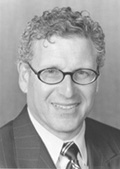
D E P A R T M E N T O
F H E A L T H P O L I C Y,
M A N A G E M E N T A N D E V A L U A T I O N
- N E W S B Y T E S -
Website
March/April 2004
NewsBytes
CONTENTS
Office of the Chair
Research
Education
Honours and Awards
Appointments
Students
Alumni
Other Notables
All Stories
Back Issues
|
Office of the Chair |
|||||||||
HPME Research Day 2004Please mark your calendars for HPME's Annual Research Day, taking place on Tuesday, May 4, 2004. A student poster session will be followed by a keynote address, awards ceremony, and catered reception. Keynote Speaker - Peter A. UbelKeynote speaker, Peter A. Ubel, will speak on "The Unbearable Rightness of Bedside Rationing". Dr. Ubel is Associate Professor of Medicine and Associate Professor of Psychology at the University of Michigan, a primary care physician at the Ann Arbor Veterans Affairs Medical Center, and Director of the Program for Improving Health Care Decisions. His research explores controversial issues about the role of values and preferences in health care decision making, from decisions at the bedside to policy decisions. He uses the tools of decision psychology to explore ethical debates about topics like informed consent and health care rationing. He is author of "Pricing Life: Why It Is Time For Health Care Rationing" (MIT Press, 2000) and is currently writing a book on illness, disability and the search for happiness. Schedule
Achievements of HPME MHSc Program Recognized in UToronto Medicine"They are top executives in Canada's leading hospitals. They are senior policy advisors, consultants, CEOs in private sector companies, academics and thought leaders. They are graduates of U of T's renowned Master of Health Science in Health Administration program, which has been producing healthcare leaders for more than a century." So begins the article "Building Leaders" in the March 2004 issue of UToronto Medicine (Volume 2, Issue 1, Page 8). The article highlights HPME's unique MHSc program in Health Administration which trains healthcare professionals for management and policy positions in diverse health services organizations. Louise Lemieux-Charles, Chair of the department of HPME, is quoted as saying that "Our underlying assumption is that there is special knowledge required to manage in healthcare. We believe it's important to understand the nature of not-for-profit and how the outcomes of your work must be measured differently." Graduates of the MHSc program featured in this article include CEO Mark Rochon (Toronto Rehabilitation Institute), Joe Mapa (Mount Sinai Hospital), Leo Steven (Sunnybrook and Women's College Health Sciences Centre) Tony Dagnone (London Health Sciences Centre) and Shirlee Sharky (St. Elizabeth Health Care) and COO Catherine Zahn (Toronto Western Hospital). Graduates point to the many advantages of completing the MHSc in Health Administration over an MBA, including an understanding of the relationship between health policy and management, the opportunity to meet leaders in Canadian healthcare, and to gain experience in healthcare settings alongside top health care administrators. Raisa Deber Appointed to the Academic BoardProfessor Raisa Deber of the Department of Health Policy, Management, and Evaluation, was acclaimed as a Faculty of Medicine representative on the U of T Academic Board. This seat has a three-year term, starting July 1, 2004. There are eleven seats in total for Faculty of Medicine representatives on the U of T Academic Board. The Academic Board of the Governing Council is responsible for admissions, curriculum, budget plans, capital plans, research, and new academic programs. Joseph Mapa Appointed to Governing Council Joseph Mapa, the CEO of Mount Sinai Hospital and Adjunct faculty of the Department of Health Policy, Management and Evaluation, was appointed to the University of Toronto Governing Council, for a three-year term effective March 10, 2004. Mr. Mapa is one of sixteen non-elected members of the Governing Council who are appointed by the Lieutenant-Governor-in-Council. The Governing Council oversees the academic, business, and institutional affairs of the University. In addition to an Executive Committee, the Council has delegated many of its powers to three boards, an Academic Board, a Business Board, and a University Affairs Board. Members of Council normally sit on at least one of these boards. |
Table of Contents |
Next Item>> |